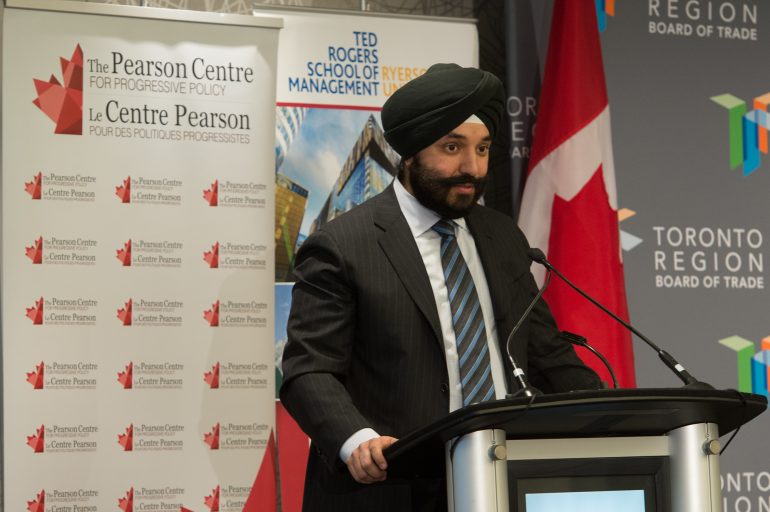Only a week after Thalmic Labs CEO Stephen Lake called on the federal government to better coordinate its innovation strategy, the Liberal budget for 2016 was unveiled featuring a few goodies for startups — and an indication that the government is looking to shift the resources and manufacturing economy we’re known for to a low-carbon economy supporting innovation.
This morning, at the Toronto Region Board of Trade, Innovation, Science, and Economic Development Minister Navdeep Bains gave a keynote addressing specifically how the budget would impact Canadian businesses.
As many in the startup space breathed a sigh of relief after learning that the government would not go ahead with its plan to tax stock options, the budget also revealed that $800 million over four years would go to support incubators and clusters, including support for initiatives delivered under the Industrial Research Assistance Program. “We must look beyond short-term responses and not only look at the price of oil; our goal is nothing less than reimagining the Canadian economy to tap into clean growth and innovation,” said Bains.
However, Bains wasn’t totally specific about how to establish these clusters or what incubators would be eligible for a piece of the $800 million.
“We’re going to go through a cluster-mapping exercise and were going to determine where the opportunities exist and where we have strength in different regions, and how we can continue in those areas to make sure that we know we have a strong presence in Canada and globally,” he said. “We’re looking at different disruptive technologies like big data, IoT, and artificial intelligence, but we’re also making sure we help traditional industries transition and become more digitized for the 21st century global economy.”
“We’re no longer the same manufacturing economy that we were in the 80s.”
With the goal of strengthening Canadian research and development, Canada is dedicating $95 million per year on an ongoing basis to granting councils, and $2 billion over three years for a new Post-Secondary Institutions Strategic Investment Fund supporting up to 50 percent of the eligible costs of on-campus infrastructure projects.
“An area we struggle in is a decline in business investment for research and development, a lot of R&D and innovation is taking place in other jurisdictions and companies in Canada have record-high cash balances on record sheet, so they’re not investing and we don’t know why, but a lot of them say we’ll ‘acquire innovation’,” Bains said. “The economy is being restructured and we’re no longer the same manufacturing economy that we were in the 80s, we are now more service-oriented.”
The government is also dedicating $130 million over five years to specifically support clean technology research and development. As Bains made it clear that the government’s vision for Canada was to embrace ICT and cleantech sectors for economic growth, the budget also revealed amendments to employment insurance for resource-dependent regions, including shorter wait times for benefits and an extension of EI regular benefits by five weeks, up to a maximum of 50 weeks for those affected. These include areas like Northern and Southern Alberta, Calgary, Saskatoon, Northern Saskatchewan, and Northern Manitoba.
Brutal #Budget2016 for small biz. Election promises to cut small biz rate & Youth Hiring Credit broken.
— Dan Kelly (@CFIB) March 22, 2016
Responding to the question of how Canada is helping later-stage businesses past the seed stage, Bains indicated that the government was still working out its larger innovation strategy. He pointed to the budget’s new immigration initiatives — which includes dedicating $25 million to reducing application processing times over the next year, and $56 million over three years to achieving higher permanent resident admissions — as a start to supporting growing companies.
“We’re going to get a holistic approach when it comes to our innovation agenda. There’s going to be a long approach focused on helping companies succeed not just in the short term but in the long-term, and it’s going to be focused on the whole of government,” said Bains. “Immigration is an example that helps companies that want to scale up and grow which benefits both large and small companies looking for appropriate talent.”
The budget also announced that the small business tax rate — which gives small businesses a reduced income tax rate of 10.5% on their first $500,000 of active business income — would be deferred. However, the cities-friendly budget does dedicate a bulk of its public transportation funding to Ontario ($1.5 billion), though it’s yet to be seen if this will have an impact on the Toronto-Waterloo Region corridor in desperate need of all-day service.
“Every time I travel abroad I talk about this corridor, next to Silicon Valley it’s the largest ICT corridor that we have. I work closely with Mayor John Tory and Mayor Berry Vrbanovic on an initiative we’ll be embarking on together, so we’re focused in this area to really help bring in more investments and more talent,” Bains said.
Related: CanCon Podcast – What is Canada’s innovation strategy?


